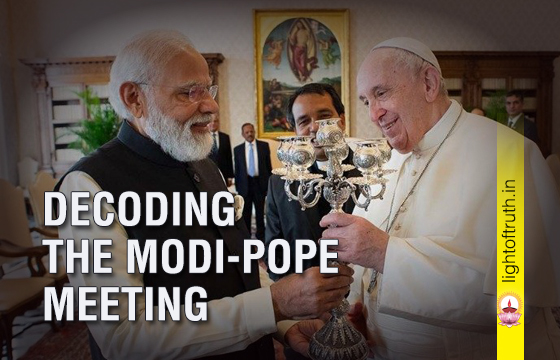Azadi ka Amrit Mahotsav Kolkata event honours four Clergymen
Pope Francis asks businesses to support working women: They’re ‘afraid to get pregnant’
Study: Christianity may lose majority, plurality status in U.S. by 2070
Indian politician declines Magsaysay Award under party pressure
Like John Paul II, Pope Francis heads to Kazakhstan during time of war

Valson Thampu
On the 30th of October 2021, Prime Minister Modi visited Pope Francis in the Vatican. The meeting scheduled to last twenty minutes lasted over an hour. Evidently pleased with the experience, Modi tweeted, embellished with winsome photographs: “Had a very warm meeting with Pope Francis. I had the opportunity to discuss a wide range of issues with him and also invited him to visit India.” After Jawaharlal Nehru in 1955, Indira Gandhi in 1981, I. K. Gujral in 1997 and A. V. Bajpayee in 1999, Modi is the fifth Prime Minister of India to have a papal rendezvous. He has charmed the Pope into visiting India in the coming year.
Dubbed a ‘private visit’ to the Pontiff –Modi being the the 3rd of the world leaders at the G20 Summit in Rome to do so- Modi and Pope Francis discussed, reportedly, an assortment of subjects that include, the COVID-19 pandemic, the economic crisis it precipitated, the recovery therefrom, poverty, and pressing issues pertaining to climate change. “Mr. Modi and the Pope discussed”, reported Foreign Ministry source, “a wide range of issues aimed at making our planet better, such as fighting climate change and removing poverty”.
This meeting assumes special significance, given that the attempt of the Catholic Church in India to persuade the Prime Minister to invite Modi to India in 2017 when Pope Francis was visiting Bangladesh and Myanmar had failed. Did the present meeting between the two leaders happen just because Modi happened to be in Rome, and is, hence, to be treated as a casual event? Or, is there something to be read by way of a change from 2017 to 2021 by which what was then inopportune and undesirable has now become welcome and worthwhile? Is the key to this change to be sought in the wider acceptance and global respect that the Pontiff has achieved in the meanwhile? Or, does it have something to do with the change in perception and strategy at home? Is this event diplomatic? Or, is it merely political?
Harsh Vardhan Shringla, the Foreign Secretary was keen to clarify that no matter of any ‘religious significance’ figured in the discussion. There is no ground for disbelieving him. Even so, it is obvious that the meeting was resonant with spiritual symbolism. Prime Minister Modi presented a silver candelabra to the Pope, emphasizing that it was ‘made especially for you in India’. The Pope, on his part, presented a bronze medallion featuring a tree, and inscribed with the words ‘The desert will become a garden’. Surely, the gifts exchanged are meant to convey something? They are not religious, as the Foreign Secretary insists; but they are undeniably spiritual.
One would have expected the Indian Prime Minster to present an exotically crafted lotus flower; for lotus is, after all, the national flower of India. Why did he prefer the candelabra, instead? It is not just any candelabra. It is a seven-branched candelabra. It is a symbol from the book of Revelation in the Bible, in which It represents the churches of Asia. This message could not have been lost on the Pontiff. Embedded in the benediction of the Pope –‘the desert will become a garden’- are two significant symbols from the Bible: the ‘desert’ and the ‘garden’. It captures, besides, the spirit of Prophet Isaiah in the Old Testament, who envisions a radical transformation in the world order. ‘They shall beat their swords into plowshares, and their spears into pruning hooks; nation shall not lift up sword against nation, neither shall they learn war anymore’. In the thinking of Pope Francis, so long as the leaders and peoples of the world harbour faith in violence, the world will remain a desert. That violence is not merely the violence of man making war on man, but also man making war on nature.
Modi presented to the Pontiff not only the candelabra but also a book titled ‘The Climate Climb: India’s Strategy, Actions and Achievements’. This relates to the spirituality of India. The spiritual culture of India is distinguished by its sensitivity to the created order. It insists on the inviolability of nature and of the earth. How can we sloganize ‘Bharat Mata ki jai!’ honestly and continue poison her vitals? Modi’s commitment to Swachh Bharat is genuine, irrespective of the extent of difference he has been able to bring about in this regard. It is indeed desirable that the Prime Minister of India assumes global leadership in promoting a culture of spiritual sensitivity to the earth as the shared home of humanity. It is naïve to promote pranayama, for example, without an earnest commitment to keeping the air pure and pristine. Else, improved techniques of breathing will only been greater efficiency in inhaling poison!
I am glad that Pope Francis has accepted the invitation to visit India, even as I am aware of the pitfalls along this path. Already attempts are afoot by the Kerala wing of the BJP to turn this into a bridge-building exercise between the party and the Catholic Church. The Pope will discredit himself if through his visit, if he compromises in any way his forthright and sanctified commitment to upholding universal values and, in particular, spiritual humanism everywhere.
Leave a Comment